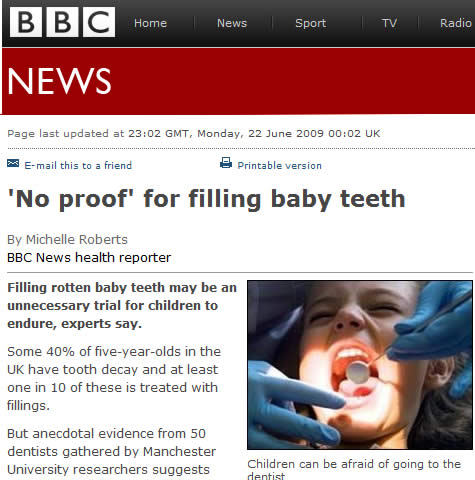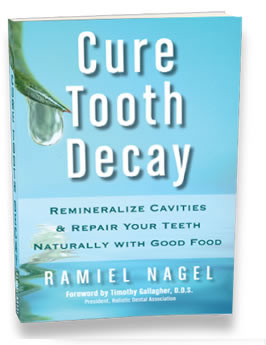British Dentists say, No Benefits, “No Proof,” and “No Evidence” to support ANY dental Treatment on painless baby teeth
The entire goal for any type of treatment, surgical or nutritional, for your child's cavities is to keep your child healthy and pain free. But there is no scientific evidence that any drilling, filling, crown, or root canals performed on a painless baby tooth have any impact on the longevity of the tooth, or whether the child experiences future pain.

Yes, you heard me correctly; as a preventative measure there is no documented evidence to show any benefits for any dental treatments on baby teeth for tooth decay. This makes sense since I have shown you how tooth decay is not cured by dentistry, and that many times dentistry makes our teeth in worse shape than before by drilling out too much of our teeth.
A meeting of over 50 practicing dentists in the University of Manchester, England, in 2009 found that treating baby teeth with cavities that are not causing pain achieved nothing other than exposing the child to the drill, and to discomfort. And there was no difference between the amount of pain or extractions in teeth with and without dental treatments. What this means is that performing dental treatments on children to prevent tooth pain or infection is an exercise in futility. It does not align with the intention of keeping your child’s teeth healthy or pain free. This is because the real cause of cavities is never addressed, and the dental treatment simply hides the problem without providing protection against cavities.
In a study of 481 children aged 1-12, it was found that after taking certain factors into consideration, 82% of decayed baby teeth fell out without pain. 18% of children experienced pain in their untreated teeth. The teeth most likely to cause pain were molars of children showing decay before the age of three years. Children who were older and developed cavities in their baby teeth were less likely to experience pain from the teeth.
British Dental Journal Dentists Speak Out Against Drilling Children's Teeth
In a 2003 study of children's tooth decay, published in the British Dental Journal, the authors write:
More disturbing perhaps, was the discovery that increased levels of restorative care in children were not associated with fewer episodes of pain or the need for extraction.
The authors of this article bring up the essential question:
Do we actually know the best way to care for children with decay in the primary dentition?
The purpose of this article was to point out that, in relation to tooth decay, we do not utilize the best methods for the care of our children. As a result of our cultural ignorance, laziness, and hidden cruelty, our children have suffered needlessly. The authors continue, regarding children's restorations:
We have no scientifically rigorous comparative data on the prevalence of pain and discomfort and longer term outcome measures associated with teeth restored with stainless steel crowns and amalgam.
To put it plainly, we do not have done the scientific case studies to prove dental procedures actually reduce or prevent pain in our children’s baby teeth. A tooth treated with dental fillings may continue to cause a child mild discomfort or cause even more discomfort than an untreated decayed tooth.
British Dental Article References
Roberts, Michelle. " 'No proof' for filling baby teeth." BBC News. N.p., n.d. Web. 4 Oct. 2010. <http://news.bbc.co.uk/2/hi/health/8112603.stm>.
Levine, R.S., Pitts, N.B., Nugent, Z.J. "The Fate of 1,587 Unrestored Carious Deciduous Teeth: a Retrospective General Dental Practice Based Study From Northern England." British Dental Journal 193 (2002): 99-303. 14 Aug. 2007 <http://www.nature.com/bdj/journal/v193/n2/full/4801495a.html>.
Milsom, K. M., M. Tickle, and D. King. "Does the Dental Profession Know How to Care for the Primary Dentition?" British Dental Journal 195 (2003): 301-303. 14 Aug. 2007 <http://www.nature.com/bdj/journal/v195/n6/full/4810525a.html>. Reprinted by permission from Macmillan Publishers LT [BRITISH DENTAL JOURNAL] 195 (2003): 301-303.
Roberts, J.F., Attari, N., Milsom, K. M., M. Tickle, and D. King. “Primary Dentition" British Dental Journal 196 (2004): 64-65. 14 Aug. 2007 <http://www.nature.com/bdj/journal/v196/n2/full/4810920a.html>

"I've always known deep down that teeth can heal naturally. When my own daughter began having dental issues, I went on a mission! Already been down that path, and being very scarred from the dental experiences I endured, I knew I couldn't put my child through it. I found Dr. Weston Price's research and my instincts told me this was it! Ramiel has now written a book, drawn from Price's findings, but specifically directed at restoring dental health. The result is a very comprehensive book that lays it all out. He is honest. And the truth is an incredible eye-opener! The protocol works. Get this book, especially if you have children."-Mrs. Brown, Canada

"Not only is Cure Tooth Decay a practical guide to teach parents how to raise healthy children (with healthy teeth), it is also a helpfull tool for adults who have suffered with poor dental health and/or chronic disease. I would also highly recommend this book to people who are looking for things they can do to protect their bones, and their overall health, as they age. In other words, this book is a must read for everyone interested in improving their health." Pam Killeen New York Times nestselling Author
Fabulous book! I work in a health food store and will be recommending it a lot. - Vimala
I purchased your cure tooth decay book and appreciate all the info that has opened my eyes to this nutritional healing. - Ace
I have read your book and I am very grateful for it. Thank you for all your hard work! - Joni


